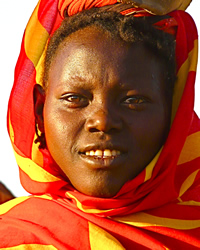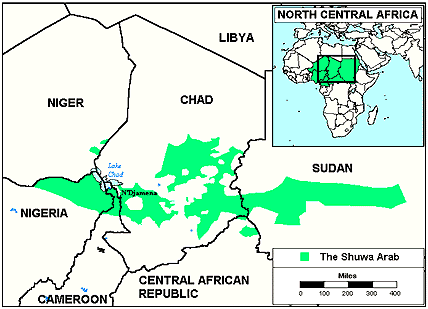Baggara is an Arabic term meaning "cattle herder. " The Baggara comprise several Arab ethnic groups inhabiting Nigeria, Sudan, Cameroon, Nigeria, and Western Chad. In Sudan, they are known as Baggara; they are referred to as Shuwa Arabs or Chadian Arabs in the other countries. The Habbania Baggara live in Sudan, and they speak primarily Sudanese Arabic. They are one of the Baggara subgroups. The Baggara entered western Sudan between the twelfth and thirteenth centuries and have gradually moved east and west from there. By the eighteenth century, they were concentrated primarily to the north and east of Lake Chad. Their tribes continued moving eastward until they became widely scattered across the horizontal plains of West Africa. They have intermarried with the tribes who lived close to them. The Baggara of Darfur and Kordofan formed the backbone of the Mahdist revolt against Turko-Egyptian rule in Sudan in the 1880s. At the end of the 19th century, the remnants of their forces returned home after their defeat at the Battle of Karari. Under the British system of indirect rule, each of the major Baggara tribes was ruled by its own chief. The Baggara have been deeply involved in other conflicts in both Sudan and Chad. Starting in 1985, the Sudanese government armed the Baggara as militia to fight a proxy war against the Sudan People's Liberation Army in their areas. The government motivated them by allowing them to loot the villages they attacked. By the mid-1990s the various Baggara groups had mostly negotiated local truces with the SPLA forces. The leaders of the major Baggara tribes at that time declared that they had no interest in joining the fighting.
Most of the Baggara tribes are nomadic. Each year, they move their herds south to the river lands during the dry season, and north to the grasslands during the rainy season. Before changing locations, the Baggara usually plant sorghum, sesame, millet, and beans in their fields, harvesting the crops on their return. The Baggara live in simple, portable dome-shaped tents built by the women. Married women own the tents and their housekeeping contents. The men build a "sun shelter" either inside or just outside of the camp. They gather there to eat, talk, nap, or entertain their friends. Habbania Baggara marriages are often polygamous. If a man has two wives, one of them may live in a pastoral camp, while the other lives in a farming village. The two households exchange products and labor, adding to the family's income and making it more flexible. Habbania Baggara men and women have distinct roles. Besides building the tents, the women milk the cows and sell the milk. They keep the income for themselves or use it to pay household expenses. They also tend to the children, go for water, prepare the daily meals, and trade in the marketplace. The men care for the herds, and also plant and harvest the crops. Although the mother is the primary caretaker of the children, the father may also interact with them from time to time. Since the women are capable of adequately maintaining the household, the men will sometimes leave for a year or two at a time to work in other countries. The Baggara depend entirely on their animals for survival. The people feed on milk and cheese during the winter. They use animal fat and dung as healing ointments. They make clothing and tents out of the skins, and ornaments and weapons from the bones.
The Baggara have been Muslims since the thirteenth century. They wear the clothes prescribed by Islam, and bury their dead facing Mecca, the "holy city. "Despite their Muslim beliefs and heritage, the Habbania Baggara also believe strongly in evil spirits. Each morning, a man sneezes in order to rid his nostrils of the evil spirit who slept there the night before.
Mission agencies have attempted to minister to some of the Baggara tribes but have met with little success. The combination of strong devotion to Islam and a nomadic lifestyle creates significant obstacles to mission work among them. Very few have come to faith in Jesus. The New Testament has been translated into the Sudanese Arabic language. The JESUS Film is available in this language, as well as other film and audio resources. But concentrated prayer and evangelism efforts are necessary in order to reach the hearts of the Baggara with the gospel.
Ask the Lord to call out prayer teams to break up the soil through worship and intercession. Pray that God will raise up long term workers to go to each Baggara subgroup. Pray that the Holy Spirit will complete the work begun in their hearts through adequate discipleship and that these disciples will disciple others. Ask the Lord to raise up strong local fellowships of believers among the Habbania Baggara that will multiply into a sustained movement to Christ. Pray for Holy Spirit directed, witnessing believers in every Habbania Baggara village.
Scripture Prayers for the Baggara, Habbania in Sudan.
| Profile Source: Joshua Project |











